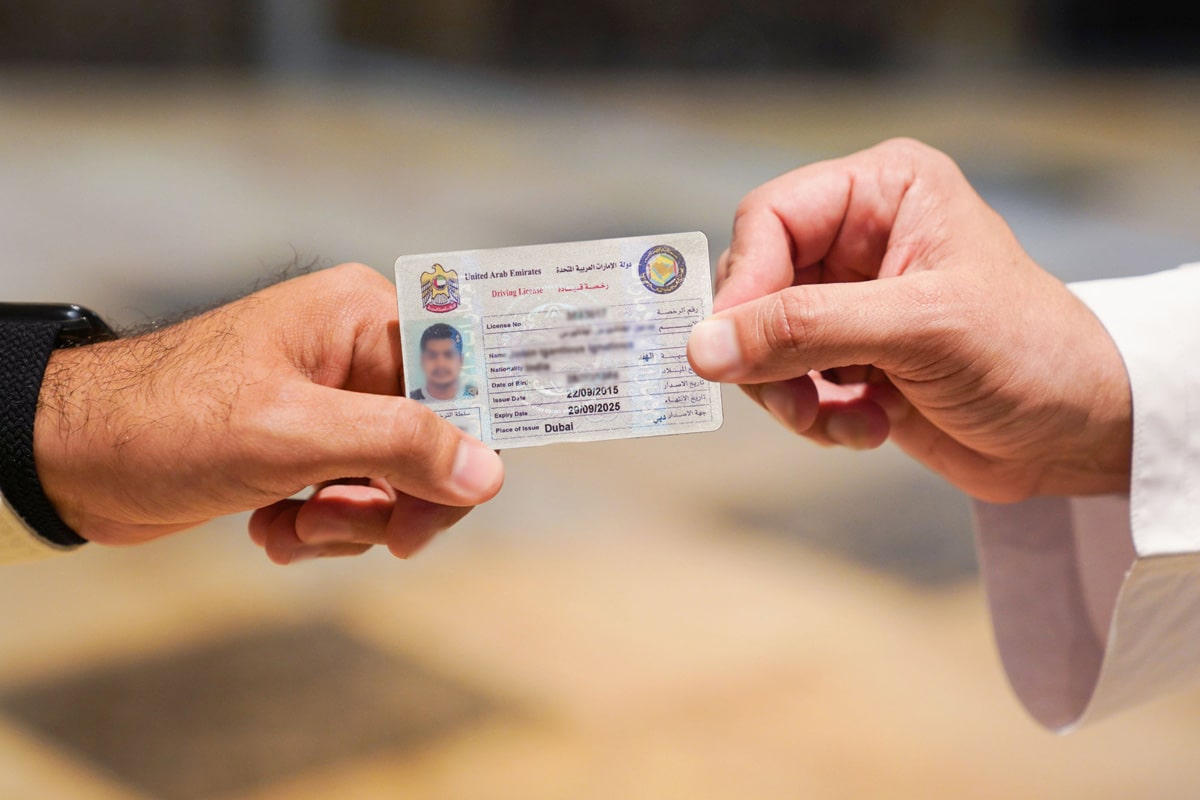As the world becomes more interconnected, the need for accurate translation services continues to rise. This is especially crucial when it comes to important documents such as driving licenses. In this blog post, we will discuss why accurate driving license Arabic translation is important and the potential dangers that can arise from incorrect translations.
Whether you are a native Arabic speaker or not, understanding the importance of accurate translation for driving permits is crucial for ensuring safety on the roads. Let’s delve into this topic further.
Why Arabic Driver License is Crucial to Drive in Dubai?
Dubai, a bustling metropolis in the United Arab Emirates, is a hub for international business and tourism. With its complex road systems and strict traffic laws, navigating the city’s streets safely requires clear understanding and communication. A driver license translated accurately into Arabic ensures that local authorities and rental agencies can verify a driver’s credentials without misunderstandings.
It’s not just about legality; it’s about facilitating smoother interactions in a region where Arabic is the lingua franca. Hence, possessing an Arabic translation of your license is essential for anyone planning to drive in Dubai.
What is the Worth of Driving License Arabic Translation?
The value of a license Arabic translation extends beyond mere compliance with local laws; it embodies the essence of cultural respect and operational efficiency in Arabic-speaking countries.
- For expatriates and tourists, it represents the bridge between their native driving qualifications and the local requirements, ensuring their ability to navigate roads without legal hurdles.
- In practical terms, an accurate Arabic translation of a license can streamline processes such as car rentals, insurance claims, and even emergency responses, by providing clear, accessible information to those who need it.
- Moreover, in business contexts where time is money, the ease facilitated by having readily accepted documentation can significantly reduce downtime and enhance the mobility of international professionals.
- For authorities, it aids in the accurate assessment of a foreign driver’s credentials and adherence to road safety regulations.
Hence, the worth of license translation lies not only in fulfilling a legal formality but in fostering a safer, more inclusive driving environment that respects the linguistic diversity of the region. So, if you’re planning a trip towards Arab countries like UAE then invest in a company that provides Driving License Arabic Translation services.
The Legal Implications of License Translation Errors
The repercussions of inaccuracies in driving permit translations, particularly from foreign languages to Arabic, can extend far beyond minor inconveniences, venturing into the territory of severe legal consequences.
- In Arabic-speaking countries, where legal documents are scrutinized for accuracy, any discrepancy or error in translation can lead to the invalidation of the license in question.
- This invalidation can result in fines, the inability to rent vehicles, delays, or even arrest for driving without a valid license.
- Furthermore, in the event of an accident, insurance companies may refuse claims if the driver’s license translation is found to be incorrect, leaving the driver to face significant financial burdens.
- Additionally, errors in translation can complicate interactions with law enforcement and other authorities, potentially leading to misunderstandings or legal disputes.
The gravity of these implications underscores the importance of ensuring that translation of a license into Arabic is precise, leaving no room for error.
Understanding the Arabic Language’s Complexity
The Arabic language is a rich tapestry of dialects and forms, making its translation a complex and nuanced task. It is a Semitic language that operates on a system of roots, where words are formed from a basic set of letters to convey a core idea.
- This structure allows for a vast array of meanings and interpretations depending on context, regional dialects, and the specific form of Arabic used.
- Modern Standard Arabic, the formal version taught in schools and used in legal and official documents, differs significantly from the colloquial Arabic spoken daily by the region’s diverse populations.
- Additionally, the language’s right-to-left script, extensive vocabulary, and grammatical rules distinct from those of many Western languages pose additional challenges for accurate translation.
- These complexities necessitate a deep understanding of the language’s intricacies, cultural nuances, and the specific context in which it is used to ensure that driving license translations are both legally compliant and culturally respectful.
- The intricate nature of Arabic underscores the necessity for professional translators who are not only linguistically skilled but also intimately familiar with the cultural and legal contexts of the Arab world.
Legal and Cultural Significance of Accurate Translation
In the Arab world, the act of translating documents like driving permits accurately goes beyond mere legal compliance; it carries profound cultural significance. Accurate translations are a testament to respect and understanding of the Arab culture and its linguistic nuances.
- In regions where Arabic is not just a language but a cornerstone of identity, presenting documents accurately translated into Arabic demonstrates an acknowledgment of the local customs and values.
- It facilitates smoother interactions across various societal levels, from everyday transactions to more formal engagements with authorities.
- Additionally, in legal contexts, precision in translation ensures respect for the laws and regulations that govern Arab societies.
- Such attention to detail in translations reflects a deeper level of engagement with the Arab world, fostering better relations and cooperation between expatriates, tourists, and local populations.
- The dual aspect of legal requirement and cultural respect underscores the indispensable role that accurate translations play in bridging divides and enhancing mutual understanding.
The Role of Certified Translators in Ensuring Accuracy
Certified translators play an invaluable role in the process of license translation, acting as the gatekeepers of accuracy and authenticity.
- The expertise is not merely in understanding the source and target languages but also in grasitating the legal and cultural nuances that must be accurately reflected in the translation.
- The professionals undergo rigorous training and certification processes to ensure they are equipped with the necessary skills to produce translations that meet the high standards required for legal documents.
- A certified translator’s involvement provides an additional layer of verification that the translation of a license into Arabic adheres to the specific terminologies and formats accepted by local authorities.
- By employing certified translators, individuals and entities can significantly mitigate the risks of errors and the subsequent legal ramifications.
- Their work ensures that the translated document is not only linguistically correct but also culturally and legally appropriate, facilitating smoother interactions with traffic and law enforcement.
Safety Concerns Stemming from Inaccurate Translations
Inaccurate translations of driver licenses pose significant safety risks on Dubai’s roads. From misunderstanding traffic laws to complicating emergency responses, the impact can be severe and far-reaching.
1. Misunderstanding Traffic Laws
Inaccurate translations of licenses can lead to misunderstandings of traffic laws and regulations, increasing the risk of traffic violations and accidents. Drivers may be unaware of important rules or restrictions, putting themselves and others at risk on the road.
2. Difficulty in Emergency Situations
During emergencies, accurate communication with emergency responders is critical. Inaccurate translations can hinder the ability to convey important information, such as medical conditions or the nature of the emergency, potentially delaying the arrival of help and worsening the situation.
3. Legal Complications
Using a license of driving with inaccurate translations can lead to legal complications. Authorities may consider the license invalid, resulting in fines or penalties for driving without a valid license. This can also impact the ability to renew or transfer the license in the future.
4. Insurance Issues
Insurance companies may reject claims if documents, including licenses, are inaccurately translated. This can leave individuals responsible for covering the costs of repairs or medical bills, adding financial strain to an already stressful situation.
5. Impact on Reputation
For businesses, inaccurate translations can damage their reputation and credibility. It can create doubts about their commitment to compliance and professionalism, potentially affecting relationships with clients, partners, and employees.
6. Personal Safety
Incorrect translations can lead to confusion and frustration during routine traffic stops or interactions with law enforcement. This can create tension and potentially escalate into unsafe situations, posing risks to personal safety.
Conclusion
Accurate translation of driver licenses into Arabic is crucial for safety and legal compliance in Dubai. Errors can lead to misunderstandings of traffic laws, difficulties in emergencies, legal complications, insurance issues, and harm to reputation. So, invest in a company that provides Driving License Arabic Translation services for a safer and more respectful driving environment in the Arab world.



